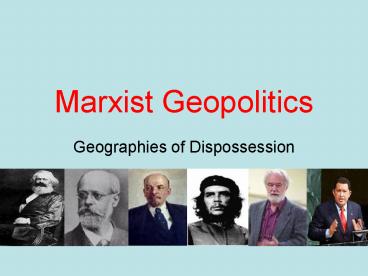Marxist Geopolitics - PowerPoint PPT Presentation
1 / 18
Title:
Marxist Geopolitics
Description:
(i) raw materials (steel, rubber, plastic) } fixed capital ... cheaper raw materials ... Imagine how quickly someone could create value equivalent to their wages. ... – PowerPoint PPT presentation
Number of Views:157
Avg rating:3.0/5.0
Title: Marxist Geopolitics
1
Marxist Geopolitics
- Geographies of Dispossession
2
The BBCs 2005 Greatest Philosopher poll
1. Karl Marx, 27.93!
6. Immanuel Kant, 5.61
2. David Hume, 12.67
7. St. Thomas Aquinas, 4.83
Marxs work offers a stunning prediction of the
nature and effects of globalization, according
to historian Eric Hobsbawm
3. Ludwig Wittgenstein, 6.80
8. Socrates, 4.82
4. Friedrich Nietzsche, 6.49
9. Aristotle, 4.52
5. Plato, 5.65
10. Karl Popper, 4.20
3
Karl Marx 1818-1883
- Considered neo-classical economics superficial
in 2 major ways - (i) It treats capitalism as a system which
evolved naturally rather than through struggle,
conflict and dispossession (primitive
accumulation) - (ii) It describes only surface details of
- capitalism (commodity fetishism).
- We need to enter the production
- process.
4
Primitive accumulation
- The historical process of divorcing the
producer from the means of production,
transforming the social means of subsistence and
of production into capital and the immediate
producers into wage laborers. - Marx, 1967714
Once the workers are forced to sell their labor,
accumulation takes place through market
exploitation
5
- To produce a commodity, the capitalist needs 3
commodities - (i) raw materials (steel, rubber, plastic)
- fixed capital
- (ii) tools, machines, fuel, factory etc.
- and
- (ii) labor
- variable capital - During production the value of all these inputs
is transferred to the commodity. - So, how does the capitalist make profit?.
6
Wage labor theory of value
- It takes 6 hours for a worker to produce 12
cokes _at_ 1 each - (1 hour 2 cokes 2 value created)
- 9am 3pm
- 9am -------------------------------------5pm
- 3pm?------?5pm
- average time to produce 12 cokes 6 hours
- --- actual hours worked 8 hours
- --- surplus labor time 2 hours
- No. of cokes produced 16
- Your income 16
- Wages paid 12
- Profit 4
- ..but, how can you ? profit?
7
Invest in new technology!
- Now, it takes 4 hours for a worker produces 12
coke bottles. - You undercut competitors, selling _at_ 92 cents
each, making a windfall! - (1 hour 3 cokes 9 value created)
- 9am 3pm
- 9am -------------------------------------5pm
- 1pm?-------------?5pm
- average labor time to produce 12 cokes 6
hours - --- actual hours worked, 8 hours
- --- YOUR surplus labor time 4 hours
- Cokes produced in a day 24
- Your income 22
- Wages paid 12
- Profit 10
8
Then, so do your competitors
Now everyone produces 12 cokes in 4 hours and
the average price starts to fall.to 67 cents (1
hour 3 cokes 2 value created, Wage 12
p/d)
3pm?------?5pm 9am -------------------------------
-------5pm 9am 3pm average labor
time to produce 18 cokes, 6 hours --- actual
hours worked, 8 hours --- surplus labor time, 2
hour No. of cokes actually produced 24 Your
income 16 Wages paid 12 Profit 4
9
Crisis of accumulation
So, as competitors adopt the same technology,
profits tend to decline You have to try to
exploit workers more and more even as they are
producing more and morethey become
politicized
how can you ? profits again?...
10
Relocate! - the spatial fix (Harvey, 1982)
Cheaper fuel, rent
?
?
cheaper raw materials
and cheaper labor!
?
11
- Now, your commodities are being sold at prices
still set by your competitors in the US
But they are being produced in a part of the
world where subsistence wages are much lower
Imagine how quickly someone could create value
equivalent to their wages. Imagine all that
surplus labor time turning into
12
European imperialism
13
World War I
- every explosion of social
- forces, instead of being
- dissipated in a
- surrounding circuit of
- unknown space and
- barbaric chaos, will be
- sharply re-echoed from
- the far side of the globe,
- and weak elements in the
- political and economic
- organism will be shattered
- in consequence. Mackinder, 1904
14
Accumulation by Dispossession
- With neoliberalism wholly new mechanisms of
accumulation have opened upthe emphasis on
intellectual property rightsthe escalating
depletion of the global environmental commons and
proliferating habitat degradations that preclude
anything but capital-intensive modes of
agricultural production (2003148)
David Harvey
15
Neoliberal Globalization
16
US imperialism
17
Conclusions
- Marxists see capitalism is system driven by a
- relentless expansion in pursuit of higher profits
- Barriers to economic expansion are
- eliminated through economic
- and non-economic means
- Geopolitics obscures this
- economic taproot of
- global conflict (Foster, 2006)
18
(No Transcript)































